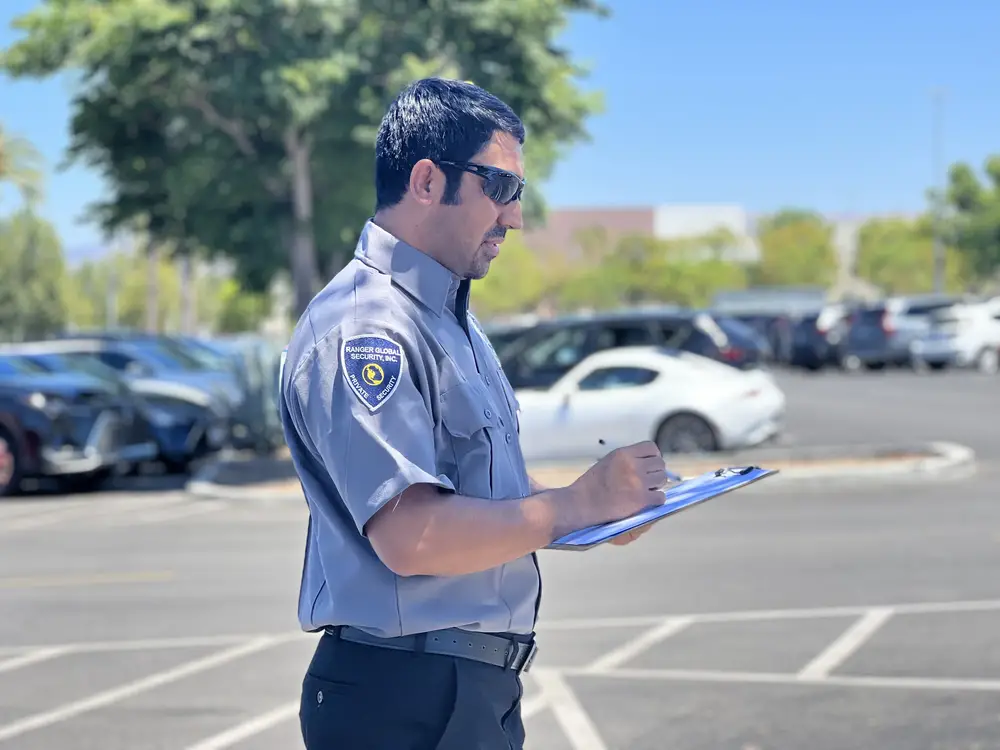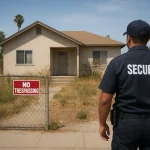Security guards play a crucial role in maintaining the safety and security of various environments, from corporate offices to residential complexes. Their duties are not limited to standing at entrances or patrolling perimeters; they involve a wide range of responsibilities to protect people, property, and assets. This blog delves into a security guard’s five basic responsibilities and duties. It discusses why their presence is vital and how to hire professional security guard services.
Top 5 Duties and Responsibilities of a Professional Security Guard
1. Ensuring the Safety of Personnel, Property, and Assets on Site
One of the primary responsibilities of a security guard is to ensure the safety of all personnel, property, and assets on the site they are assigned to protect. This includes employees, visitors, and any physical or intellectual property within the premises. Security guards achieve this by actively monitoring their surroundings, identifying potential threats, and taking preventive measures to avoid any incidents. They are often the first line of defense in situations where security is compromised, making their role indispensable in maintaining a safe environment.
To fulfill this duty effectively, security guards must always be vigilant. They must stay alert and observant, constantly scanning for any unusual activity or behavior that could pose a threat. In addition, security guards are responsible for enforcing safety protocols and ensuring that all personnel adhere to them. This might include checking IDs, controlling access points, and ensuring that everyone on-site is authorized to be there.
2. Monitoring and Controlling Access to the Premises
Another critical duty of a security guard is monitoring and controlling access to the premises. This involves managing entry and exit points and ensuring that only authorized individuals are allowed on-site. Security guards may be required to check identification, verify credentials, and maintain a log of all visitors and personnel entering and leaving the premises.
In addition to managing access, security guards monitor surveillance systems and security cameras to keep a close eye on the premises. They can quickly identify and respond to any suspicious activity or unauthorized access attempts. This constant vigilance helps deter potential intruders and prevent security breaches.
Moreover, security guards often use access control systems such as key cards, biometric scanners, and metal detectors to enhance security measures. These tools allow them to manage access more efficiently while ensuring that only authorized personnel can access sensitive areas.
3. Responding to Emergencies and Incidents
Security guards are trained to respond quickly and effectively to emergencies and incidents that may arise on-site. This can include anything from medical emergencies and fires to security breaches and criminal activity. When an incident occurs, security guards are often the first responders, tasked with assessing the situation, calling for additional assistance if needed, and taking appropriate action to mitigate the threat.
In an emergency, security guards must remain calm and composed, even under pressure. They are responsible for guiding personnel to safety, providing first aid if necessary, and coordinating with emergency services such as the police, fire department, or medical responders. Their ability to handle emergencies efficiently can significantly minimize damage and ensure the safety of all individuals involved.
Additionally, security guards play a vital role in post-incident management. They are responsible for securing the area, preserving evidence, and assisting with investigations. Their quick response and detailed observations can be invaluable in identifying the cause of an incident and preventing similar occurrences in the future.
4. Conducting Regular Patrols and Inspections
Regular patrols and inspections are essential components of a security guard’s duties. By patrolling the premises regularly, security guards can identify potential security risks, such as unlocked doors, broken windows, or malfunctioning equipment. These patrols also serve as a visible deterrent to potential criminals, as the presence of a security guard can discourage unlawful activities.
During patrols, security guards must be thorough and methodical, checking all areas of the premises, including parking lots, entryways, and restricted zones. They must also be prepared to confront and question individuals acting suspiciously or violating site policies.
In addition to patrolling the premises, security guards are responsible for inspecting security equipment, such as alarms, surveillance cameras, and access control systems. They must ensure that all equipment is functioning correctly and report any issues or malfunctions to their supervisors. Regular inspections help maintain the integrity of the security system and ensure that it is ready to respond to any potential threats.
5. Maintaining Accurate and Detailed Incident Reports
A crucial aspect of a security guard’s duties is maintaining accurate and detailed incident reports. These reports record all incidents, activities, and observations during their shifts. Incident reports are essential for several reasons, including legal protection, liability management, and identifying security trends or patterns.
When documenting an incident, security guards must include all relevant details, such as the time and date of the occurrence, the individuals involved, and the actions taken in response to the incident. They should also include witness statements, photographic evidence, or other supporting documentation. Accurate reporting is critical for ensuring that incidents are handled appropriately and that there is a clear record of the events.
Incident reports are also valuable tools for improving security measures. By analyzing the data collected in these reports, security managers can identify potential vulnerabilities and make informed decisions about enhancing security protocols.
Why Do We Need a Security Guard?
The presence of a security guard serves as a powerful deterrent to potential criminals and intruders. Knowing a trained professional monitors the premises can discourage theft, vandalism, and other illegal activities. Security guards also provide peace of mind to employees, visitors, and residents, knowing their safety is a top priority.
In addition to preventing crime, security guards play a vital role in emergencies. Their training and quick response can help to mitigate the impact of incidents such as fires, medical emergencies, or security breaches. By having a security guard on-site, organizations can ensure they are prepared to handle a wide range of situations, protecting people and property.
How to Hire Professional Security Guard Services
Hiring professional security guard services requires careful consideration of several factors.
First, it is essential to assess your organization’s or property’s specific security needs. This includes determining the level of security required, the types of threats you may face, and the areas that need the most protection.
Once you have identified your security needs, choosing a reputable security company with a proven track record is important. Look for companies that are licensed, insured, and have positive reviews from clients. Additionally, inquire about the training and qualifications of their security guards, ensuring that they are equipped to handle the responsibilities and duties outlined in this blog.
When interviewing potential security providers, ask about their approach to security, their use of technology, and how they handle emergencies. Discussing their incident reporting procedures and how they communicate with clients is also important.
Finally, consider the cost of security services and ensure that it aligns with your budget. While it may be tempting to choose the lowest bidder, it is important to prioritize quality and reliability when selecting a security provider.
Conclusion
Security guards are essential in ensuring the safety and security of various environments. Their responsibilities, from monitoring access to responding to emergencies, are critical in maintaining a safe and secure environment. Hiring professional security guard services ensures you have trained and capable individuals protecting your assets and personnel.





